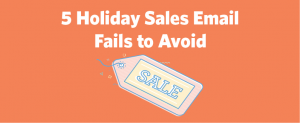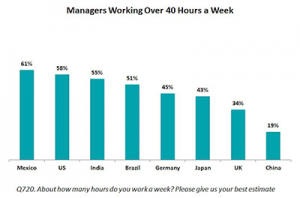Blogging is changing.
I should know; I’m a blogging old-timer. I started blogging in 1999 — before “blogging” and content management systems were really even a thing. I went into the html of my website (complete with neon fonts and dancing hamsters) and updated the text manually every week.
Since then, blogging has come a long way, and it’s still changing.
One of the biggest changes I see that confuses a lot of people is the difference between blogging as a business and blogging for your business.
Fashion bloggers, mommy bloggers, DIY bloggers, food bloggers and many other categories are people who blog AS their business. They sell advertising, sponsored posts, affiliate products or maybe even some kind of digital product they’ve created — but their business literally would not exist without the content they create first.
On the other hand, in the past few years, blogging FOR a separate business — also known as content marketing — has taken off. Everyone from solopreneurs like us all the way up to Fortune 500 companies are using content to market the products and services they sell. I was having a playdate (OK, my DAUGHTER was having a playdate) with a friend who is a real estate agent, and she told me that everything she hears about how to grow her business these days is about online content marketing.
Two very different business models — and two very different ways of making money by blogging. If you Google “make money blogging,” 95% of the results that come up are about how to make money using the first model, that is, creating content and then monetizing it.
For most of my audience, however, that isn’t the kind of advice you need. You need to know how to use content to market your existing products: you need content marketing.
What’s the difference between blogging and content marketing?
I polled my current class of Blogstorm on whether they thought what I was teaching was blogging or content marketing. Here are a few of their answers:
- “I think you absolutely are teaching content marketing. But I think that’s a more advanced term. For me it’s been this process of ‘damn, I need to blog and get good at blogging in order to reach my audience.’ I didn’t know I needed content marketing. I didn’t know my blog IS content marketing. Only recently have I started to think about blogging in the context of content marketing. Before content marketing sounded so fancy pants and over my head. It was something I’d get to later once I figured out how to do this damn blogging thing.”
- “I came for blogging, because I needed someone to hold my hand and show me a professional process for getting content out there. The content marketing is what professional blogging *is* — and it’s how to blog with a point. Your tag line about the difference between a business blogger and a hobby blogger being a plan is exactly right.”
- “In the middle — some of each. You are definitely teaching more than straight blogging. I was brought in by the idea of developing an editorial calendar as a way to plan a blogging schedule. I wasn’t specifically expecting you to teach us about promoting that content, which is what content marketing means to me. But I’m very happy you are!”
Although they’re all talking about much the same things, there’s clearly some confusion. So let’s clear that up:
If you are selling a product or service, all blogging is content marketing. However, not all content marketing is blogging.
Clear as mud? Lemme ‘splain.
As Tara Gentile so brilliantly put it in a blog post recently, content marketing is all about using content (blog posts, videos, podcasts, images, Facebook updates, tweets, etc.) to sell a product. She says, “Honestly, I think we’d be well-served to start talking about ‘content selling,’” and I totally agree.
But here’s what could be an uncomfortable question for many of you:
Is your blogging making you money?
For many of my clients, the answer is… “I don’t know. (Probably not.)”
So let’s look at how you can tell if your blog is making you money, and I’ll talk about how content marketing makes you money in my next post.
If you want to be sure you see this entire series on making money with your blog, click here to start getting my posts delivered by email.
How do I know if my blog is making money?
Here’s the sticky wicket when it comes to content marketing: ROI (that’s Return On Investment) is notoriously difficult to track.
Because you probably don’t have a “BUY NOW!” button on every blog post, it can be difficult to determine if a particular post leads to sales. But there are some things you can (and should) track to find out if your post is making you money:
- Where do people go after they read your post? In Google Analytics, you can track the “behavior flow” of traffic on your website; in other words, you can see where they go after they land on a blog post. GA will tell you what percentage of people exit your site for each page. So, if a high percentage of people exit your site from a particular blog post, that means they’re not clicking around and buying something — or even signing up for your mailing list, probably. If they click around a bit, it’s much more likely that they will convert. If they click to a landing page or sales page, that’s even better.
- How many opt-ins do you get from each post? Email marketing is still — bar none — the best way to get people to buy from you. But you have to get people to opt into your list before you can use email to market to them (obvs). So, one good way to determine the value of a blog post is by how many people sign up from each one.
- How many new people are coming to your website because of your blog? There’s an old sales adage that people must be exposed to a product, service, or message seven times before they make a purchase, and while the number may be a bit fuzzy, there’s some good logic here. When was the last time you saw something on the Internet and bought it right away? So if your blog is acting as a promotional tool, regularly bringing new visitors and readers to your website, it’s serving a value.
By understanding how your blog is functioning as a part of your overall marketing strategy, you can determine if it’s pulling its weight and helping you make money in your business.
Don’t fall for this common mindset trap
Many business owners start to feel a little depressed at this point.
Maybe their numbers aren’t as good as they’d hoped. Their blog isn’t pulling in many new readers, they aren’t getting a lot of opt-ins, and people aren’t sticking around to read their website (high bounce rate).
And so they think, “Wow. Clearly this whole blogging thing isn’t working for me. I should just give up and focus on something else.”
For most people, giving up on blogging is not the answer. Instead, we need to examine our strategy (or create one) and figure out how to improve those numbers.
A blog post should never stand alone; it’s part of an ongoing marketing conversation you’re having with your potential customers.
I often describe blogging as a long-form sales letter, dripped out over time. Instead of having one conversation with someone in person, you’re dripping that conversation out over four or five blog posts.
A single blog post will rarely get you results; a strategy over time is what builds your business, improves your sales, and makes you money through blogging.
Got questions about this? I’d love to hear them in the comments below, because in my next post, I’m going to talk about how to set up your blog so that it starts making you money.
Digital & Social Articles on Business 2 Community(64)





